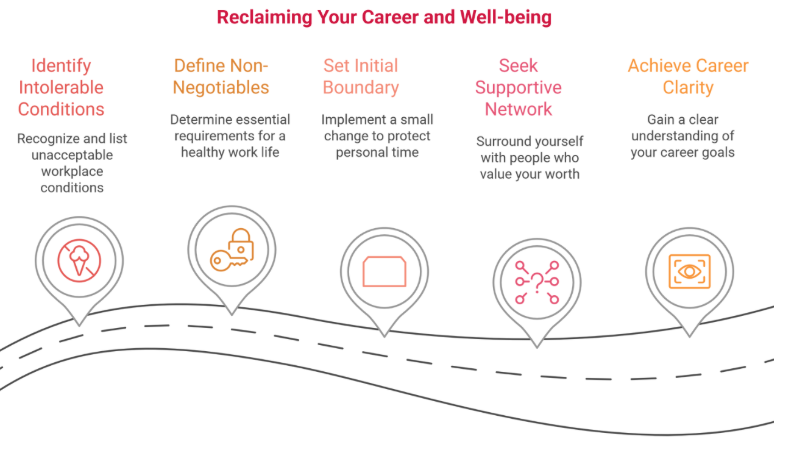
I used to think being a “good employee” meant showing up no matter what.
Heart pounding out of my chest? Still showed up.
Vision tunneling until the computer screen barely made sense? Still showed up.
My anxiety screaming, please stop? You guessed it… I pushed through.
If you’ve ever lived with anxiety, you know that survival mode. Telling yourself, just one more email, just one more meeting, until you’ve completely abandoned yourself. And then one day, you look up and realize all those “just one mores” have turned into years of ignoring what your body was begging you for.
That was me before I made real changes in my life. Changes that let me step into work that supports me instead of draining me.
So when I met my client Laura, who’s now also part of my team, and she shared her story about pushing through panic attacks in a job that was slowly breaking her, I didn’t just nod politely. I felt it. Because I had lived it too.
When Laura joined my Career Clarity Formula, she wasn’t just searching for a new job. She was looking for a new way of living. And through that process, she found her way out.
My hope in sharing her story is simple: to remind you that change is possible for you too.
Anxiety at Work: Why Laura Never Took a Mental Health Day
In her old job, Laura never once took a mental health day. Not because she didn’t need to, but because she didn’t feel like she was allowed to. The unspoken rule was clear: unless you were visibly sick, you showed up.
So she showed up. Even when she knew a panic attack was coming. Even when she was covered in stress hives. Even when brain fog made the simplest tasks feel impossible.
One morning, her anxiety hit so hard she thought, I should be at home… or maybe even in a hospital. But instead of listening to herself, she walked into work like nothing was wrong.
Because in her mind, being “responsible” meant ignoring what her body was begging her to do.

The Breaking Point: How a Toxic Workplace Ignored Laura’s Anxiety
Like every other day, Laura walked into work determined to push through. That was the rule she had always lived by: show up, smile, get it done. But this time, her body gave out. The panic attack hit so hard she could not breathe, could not see straight, could not even pretend to keep going.
And the thought of telling her boss made it even worse. He belittled her in front of colleagues, barked at her mistakes, and spoke to her like she was beneath him. If she asked a question, he rolled his eyes like she was wasting his time. There was never a please. Never a thank you. Just a finger stabbing at her desk with a sharp command: “This needs to get done. Now.” Most days, it felt safer to quietly figure things out alone than risk walking into his office.
But this time, she couldn’t fake it. Desperate and out of options, she forced herself to walk in and said, “I have anxiety. It feels like a heart attack. I need to go to the doctor.”
The response was brutal. Not concern. Not even curiosity. Just a look of irritation, like she had asked for the afternoon off to get a pedicure. That was what crushed her.
As a woman, she had always feared that admitting she was struggling would be taken as weakness, drama, or laziness. And in that moment, it was confirmed. Her loyalty, years of pushing through panic and exhaustion, meant nothing. Walking out that day was not just about going to the hospital. It was the painful beginning of a new chapter, one where she would learn, step by shaky step, that putting her needs first was not selfish. It was survival.
Why So Many Women Push Past the Breaking Point at Work
Laura’s story isn’t the exception. It’s the norm.
From an early age, women are taught that our value comes from how much we can handle and how comfortable we can make everyone else. We learn to smile through exhaustion, say yes when we want to scream no, and we think it’s strength, but it’s really self-abandonment.
We push through migraines, panic attacks, and gut-deep exhaustion because we believe rest is a luxury and asking for help is weakness. We feel guilty for even wanting relief. So we keep showing up, even when our bodies are begging us to stop.
And we’re told that’s what good women do:
- Be agreeable.
- Be tireless.
- Be accommodating.
- Be self-sacrificing.
But the cost is brutal. Our health erodes. Our boundaries collapse. Our trust in ourselves disappears. And still we whisper, just one more email, just one more meeting, just one more way to prove I’m worthy.
This is the trap. And it’s not just personal. It’s systemic. Workplaces built on loyalty and sacrifice will take every ounce we give until there’s nothing left. Women especially are pressured to give it all, to keep smoothing edges and silencing needs until we’re a shell of ourselves.
If you’ve ever pushed yourself to the breaking point, not because you wanted to, but because you thought you had no choice, you’re not alone. You’ve been trained to do it. And you deserve better.

Red Flags and Green Flags for Mental Health at Work
After years of being trained to push past our limits, it helps to know what to look for in a workplace. Some environments will keep you stuck in the same cycle of burnout, while others will give you the safety and support to do your best work without abandoning yourself.
Red Flags (warning signs of a toxic workplace):
- Deadlines that are impossible to meet, with workloads that keep growing but no real support.
- Managers who micromanage every detail, leaving you feeling anxious instead of trusted.
- A culture where asking for help or time off feels risky, as if it will be held against you.
- Leaders who never ask for your input, making it clear your perspective doesn’t matter.
Green Flags (signs of a healthy workplace):
- You can ask for time off without guilt, and leaders encourage you to actually take it.
- It feels safe to admit when you’re unsure, need help, or make a mistake.
- Managers check in regularly, not just about deadlines but about how you’re doing.
- Mutual respect is the norm. You respect your leaders because they respect you.
Here’s the hopeful part: spotting these signs gets easier once you know your own non-negotiables. That’s exactly what Laura discovered in the Career Clarity Formula, and it’s what opened the door to her new path.
Finding Career Clarity After Burnout
When Laura joined my Career Clarity Formula, she wasn’t just trying to escape a bad job. She was trying to build an entirely new life.
“I knew I couldn’t keep doing what I was doing anymore,” she told me. “I couldn’t survive another workplace where my well-being didn’t matter, where taking care of my mental health felt impossible.”
From the start, we sat down and talked about her non-negotiables, what she absolutely needed in her next role to protect her mental health and thrive. Together, we uncovered that she wanted:
Work rooted in empathy and respect. Not a place where she felt like a number, but a culture where her loyalty and contributions were truly valued.
Work that energized her. Projects that put her in a flow state and supported her mental health instead of draining it.
Work with safe boundaries. A role where she could advocate for herself without fear, and where flexibility around her health was treated as normal.
“The Career Clarity Formula didn’t just change my career,” Laura said. “It changed my entire life. I don’t feel like I have to abandon myself anymore. My standards for how I expect to be treated at work and in my personal life have completely shifted. I’ve learned how to advocate for myself. I can tell the difference between toxic and healthy relationships. That kind of change is priceless.”
“Theresa taught me that I deserved better. At first I didn’t believe it, but she believed it for me until I did. As I went through the program, I saw her other clients leave toxic jobs for healthier ones, and it gave me so much hope. Through her program and working with her, I finally found my way to something better than I could have ever imagined. And I want other women to know they can too. If I can, they can too.”

Workplace Flexibility That Actually Supports Mental Health
Today, Laura’s career looks nothing like the one that nearly broke her.
Her role isn’t just remote. It’s built on trust and flexibility. If brain fog hits, she can rest. If inspiration shows up at eight o’clock at night, she has the freedom to follow it. Instead of being measured by how many hours she’s glued to a desk, she’s trusted for the quality of her work.
“The irony,” Laura told me, “is that working somewhere I’m allowed to have a panic attack has actually made them happen far less. Knowing I don’t have to hide or pretend takes away so much of the pressure I used to carry every single day.”
And the difference isn’t only about flexibility. It’s about culture. Laura no longer feels like she has to walk on eggshells or fear being judged for asking for what she needs. Instead, she feels supported as a whole person.
As I often remind my team, “Compassion isn’t a perk. It’s the foundation of how we work. If someone needs space, time, or extra support, my first question is always, what can I take off your plate? That’s what builds real trust.”
That kind of environment doesn’t just make employees happier. It makes them healthier, more creative, and more committed. For Laura, it has been nothing short of life-changing.

Practical Shifts You Can Make Right Now to Reclaim Your Career
Laura’s story is proof that change is possible. If you’re sitting in a role that feels impossible to survive, here are steps you can take to start reclaiming your career and protecting your well-being:
- Name what you will no longer tolerate.
Write a “never again” list. Maybe it’s a boss who belittles you, a schedule that leaves you no time for rest, or a culture where speaking up feels unsafe. Whatever broke you down in the past, put it in writing. This list becomes your guide. - Get clear on your non-negotiables.
What do you absolutely need in your next role to protect your health and live well? Flexibility, empathy, respect, boundaries, these are not nice-to-haves. They’re your baseline. - Start with one boundary right now.
Don’t try to change everything overnight. Choose one line to hold, whether that’s no checking email after dinner, a real lunch away from your desk, or saying no to one extra project. Boundaries build strength like muscles, one rep at a time. - Surround yourself with people who remind you that you deserve more.
Friends, a partner, colleagues, or a coach can help you see your worth when you’ve forgotten it. They can encourage you to rest without guilt, remind you that saying no is a strength, and keep you focused on the life you’re building instead of the one you’re leaving behind. - Build clarity before you leap.
If you’re job searching, don’t just jump into the next opportunity that shows up. Get clear first. Without clarity, you risk trading one toxic environment for another.
That kind of clarity doesn’t just happen by accident. It’s built step by step. It’s the kind of work we do inside the Career Clarity Formula. Together, we’ll uncover your non-negotiables, identify the skills that light you up and the ones that drain you, and map out the path forward.
The goal is not to settle for any job. The goal is to find the right job, your dream job, one that supports your health, honors your values, and gives you the kind of life you truly deserve.
You Deserve Work That Supports Your Life
Your mental health isn’t optional, and your worth isn’t defined by how much you can push through. No job, no matter how shiny the title, is worth sacrificing your peace of mind, your boundaries, or your sense of safety.
If Laura’s story feels familiar, take it as your sign. You don’t have to keep proving your value by abandoning yourself. You deserve more. You deserve a career that values you as a whole human being.
As Laura told me: “The Career Clarity Formula didn’t just change my career. It changed my life. I honestly don’t know where I’d be without it. I probably would have ended up in another toxic role, because I didn’t know what to look for and I didn’t believe I deserved better. Having someone believe in me before I could believe in myself gave me the confidence to finally choose differently.
Now I have a job where I feel safe asking for help, where my feedback is valued, and where I’m encouraged to take time off. Theresa is always curious about making sure I focus on projects that truly light me up and make me happy. That alone still feels so unreal to me. I never thought a job like this could exist, and now it’s my reality. And I want other women to know it can be theirs too.”
And this is why I do the work I do. For stories like Laura’s. For the moment a woman realizes she doesn’t have to settle anymore, and finally believes she deserves better.
About Career Coach and Founder
Theresa White, Career Clarity Expert, 5x Certified Career Coach, and the Founder of Career Bloom, is known for her expertise in guiding people to get unstuck and find the direction they need to move forward in their careers—fast. In a time when so many people are re-evaluating their work, Theresa offers actionable insights that empower clients to identify their true strengths and pursue work that genuinely aligns with their goals.
Theresa’s clients often call her sessions “epiphanies” and “transformational.” She brings immediate clarity to career goals, helping people unlock a deep understanding of what makes work fulfilling for them. Past participants consistently describe her approach as “spot on” and an “answer to questions they’d been asking for weeks.”
Theresa’s approach is empathetic yet practical, and she’s known for empowering clients with a clear direction in as little as 30 days, guaranteeing results.
Connect with Theresa on LinkedIn, listen to the Career Clarity Unlocked Podcast, or schedule your free 30-minute career clarity consultation.

FAQs: How to Leave a Toxic Workplace
-
What is the Career Clarity Formula and how does it work?
The Career Clarity Formula is my step-by-step coaching program that helps women get clear on the career they’re truly meant to do. In just 30 days, we uncover your non-negotiables, identify the skills that energize you, and map out the roles that align with your values and your life. With group coaching, private sessions, and proven tools, you’ll walk away knowing exactly what kind of career will make you fulfilled, and how to land it. And it’s completely risk-free: if you don’t gain career clarity in 30 days, you get your money back.
-
Can changing my career really improve my mental health?
Yes. When your work constantly drains you, it doesn’t just stay at the office, it follows you home, affects your relationships, and impacts your confidence. On the other hand, when your job aligns with your values and strengths, it gives you energy instead of stealing it. You sleep better, you feel more present with your family, and you stop living in survival mode. Shifting into the right career is often the first step to restoring your overall well-being.
-
What if I don’t know what kind of job I want?
That’s more common than you think. Most of the women I work with don’t start with a clear picture. They start with “I just know I can’t keep doing this.” The key isn’t to scroll job boards until something clicks. The key is to slow down and figure out what you actually need to feel good at work: the environment, the values, the kind of work that makes you feel alive instead of empty. Once you see that clearly, it changes everything, and finding the right role finally feels possible.
Related Reads + Freebies
- What to do when you're feeling stuck in career
- How to Find Your Perfect Career
- 8 progressive companies to work for
- 7 Message Templates to Reach Out to Recruiters
- How to Use AI to Find a Job in 2025: Why Soft Skills Still Matter
- Free Job Search Tracker
- Get Career Clarity In Just 30 Days!
Subscribe now to never miss the latest blog!
Every Thursday, we cover an important topic, actionable advice, and inspiring content to help you find work that makes you feel like *pinch me* I'm getting paid to do this???
We hate SPAM. We will never sell your information, for any reason.





